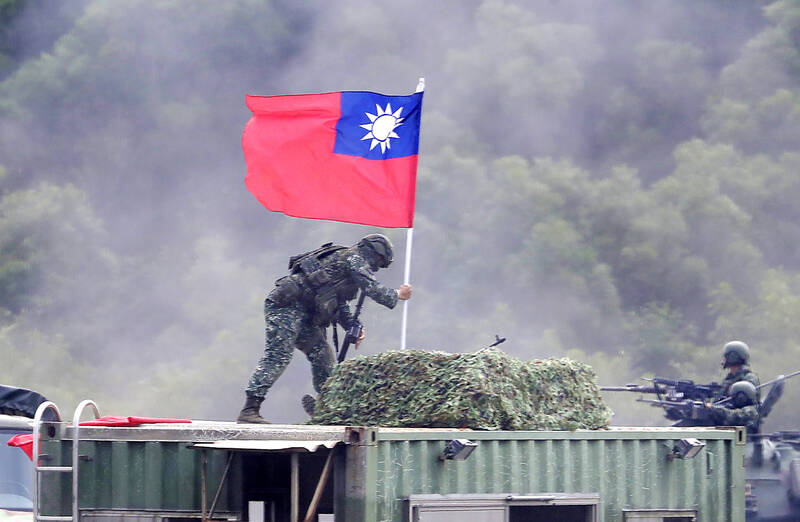Nearly three-quarters of Americans would support the US recognizing Taiwan as an independent country to defend the nation in the event of a Chinese invasion, while a majority supported US defense assistance to Taiwan, a Ronald Reagan Presidential Foundation and Institute poll showed on Thursday.
The institute’s Reagan National Defense Survey assesses perspectives on key issues in defense, national security and foreign policy.
Seventy-two percent of respondents supported the US defending Taiwan by “officially recognizing Taiwan as an independent country” in the event of a Chinese invasion, the poll showed.

Photo: Chiang Ying-ying, AP
The majority also supported the US to take other measures in such a situation, including imposing economic sanctions against China, moving US military assets to the region, sending more military equipment to Taiwan and establishing a no-fly zone in the area, it showed.
Forty-six percent supported committing US ground troops to the defense of Taiwan, with the rate rising yearly from 39 percent in 2019, the institute said.
Beijing’s military buildup and human rights abuses were the most concerning aspects of Chinese activity, with each option selected by 20 percent of respondents, the survey showed.
Asked whether they were concerned about the potential of China invading Taiwan, 31 percent said that they were “extremely concerned” while 42 percent said that they were “somewhat concerned,” it showed.
Support for US security assistance to Israel, Ukraine and Taiwan was 71 percent, 67 percent and 65 percent respectively, it showed.
Support for increasing the US military presence near Taiwan and arms sales to deter China from launching an attack was 60 percent and 55 percent respectively, it showed.
Respondents were more likely to support sending US troops to help Taiwan repel an invasion when informed that the nation has a democratically elected government, and is a major manufacturer of electronics and semiconductors, the institute said.
Seventy-one percent were concerned that Russia’s invasion of Ukraine would prompt other authoritarian countries to invade their democratic neighbors, it said.
Asked if they saw Taiwan as an ally of the US, 64 percent said “yes,” while only 15 percent saw China the same way and 77 percent saw it as an enemy, the poll showed.
Respondents said that the US had superior military capabilities, diplomatic influence and economic strength than China, but Chinese artificial intelligence and cyber capabilities were seen as superior to the US, it showed.
A majority believed that China would gain military power and economic strength at a faster rate than the US over the next decade, the survey showed.
The survey was conducted from Oct. 27 to Nov. 5, garnering responses from 2,506 adults in the US via telephone and the Internet.
It had a confidence level of 95 percent and a margin of error of 2 percentage points.

Right-wing political scientist Laura Fernandez on Sunday won Costa Rica’s presidential election by a landslide, after promising to crack down on rising violence linked to the cocaine trade. Fernandez’s nearest rival, economist Alvaro Ramos, conceded defeat as results showed the ruling party far exceeding the threshold of 40 percent needed to avoid a runoff. With 94 percent of polling stations counted, the political heir of outgoing Costa Rican President Rodrigo Chaves had captured 48.3 percent of the vote compared with Ramos’ 33.4 percent, the Supreme Electoral Tribunal said. As soon as the first results were announced, members of Fernandez’s Sovereign People’s Party

MORE RESPONSIBILITY: Draftees would be expected to fight alongside professional soldiers, likely requiring the transformation of some training brigades into combat units The armed forces are to start incorporating new conscripts into combined arms brigades this year to enhance combat readiness, the Executive Yuan’s latest policy report said. The new policy would affect Taiwanese men entering the military for their compulsory service, which was extended to one year under reforms by then-president Tsai Ing-wen (蔡英文) in 2022. The conscripts would be trained to operate machine guns, uncrewed aerial vehicles, anti-tank guided missile launchers and Stinger air defense systems, the report said, adding that the basic training would be lengthened to eight weeks. After basic training, conscripts would be sorted into infantry battalions that would take

EMERGING FIELDS: The Chinese president said that the two countries would explore cooperation in green technology, the digital economy and artificial intelligence Chinese President Xi Jinping (習近平) yesterday called for an “equal and orderly multipolar world” in the face of “unilateral bullying,” in an apparent jab at the US. Xi was speaking during talks in Beijing with Uruguayan President Yamandu Orsi, the first South American leader to visit China since US special forces captured then-Venezuelan president Nicolas Maduro last month — an operation that Beijing condemned as a violation of sovereignty. Orsi follows a slew of leaders to have visited China seeking to boost ties with the world’s second-largest economy to hedge against US President Donald Trump’s increasingly unpredictable administration. “The international situation is fraught

GROWING AMBITIONS: The scale and tempo of the operations show that the Strait has become the core theater for China to expand its security interests, the report said Chinese military aircraft incursions around Taiwan have surged nearly 15-fold over the past five years, according to a report released yesterday by the Democratic Progressive Party’s (DPP) Department of China Affairs. Sorties in the Taiwan Strait were previously irregular, totaling 380 in 2020, but have since evolved into routine operations, the report showed. “This demonstrates that the Taiwan Strait has become both the starting point and testing ground for Beijing’s expansionist ambitions,” it said. Driven by military expansionism, China is systematically pursuing actions aimed at altering the regional “status quo,” the department said, adding that Taiwan represents the most critical link in China’s